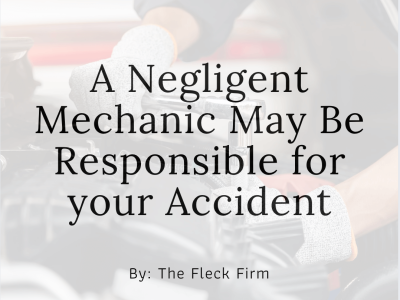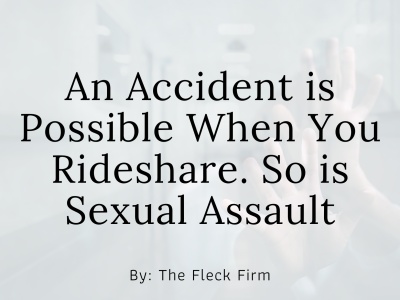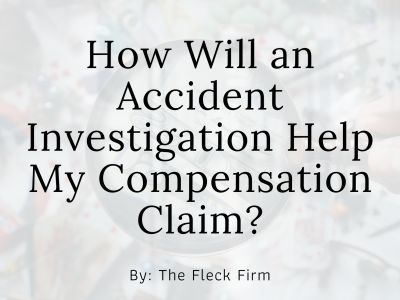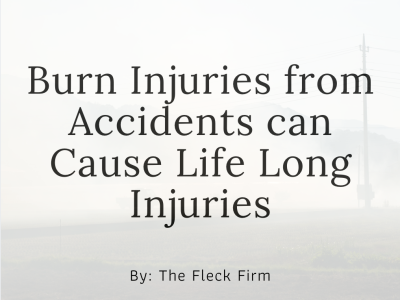You are legally obligated to drive a reasonably safe vehicle on public roads, and your mechanic plays a vital role in ensuring that happens. A mistake by a mechanic or a repair shop that’s serious enough to cause an accident may also trigger legal liability (an obligation to compensate an accident victim) for any harm it causes. This situation may arise if your vehicle is poorly maintained and crashes or another car isn’t repaired correctly and strikes you.
What is Negligence?
Personal injury claims are based on negligence unless there’s evidence an intentional act causes injuries. Negligence requires the plaintiff (the injured party filing the lawsuit) to prove the following elements:
- The defendant (the party sued) owed you a duty or legal obligation (to do or refrain from doing something given the circumstances) because of the relationship between you (customer and mechanic)
- The defendant breached that duty or failed that obligation
- That breach or failure was the accident’s legal (or proximate) and factual cause, and it resulted in your injuries
- You suffered damages (a measurement of your harm in dollars)
- The defendant must pay you damages under Kentucky law
The plaintiff has the burden of proving that these elements are more likely than not using the evidence developed during the case. Not every mistake causing harm is the result of negligence and not all of these cases are successful.
In this situation, you would be suing your mechanic and their employer (if they work for someone else). They should have liability insurance coverage, which should compensate you for your losses. These cases often settle. If not, they may go to trial, and the insurance carrier will pay for the defendants’ legal defense and jury award.
Other attorneys take contingent fees of 33% to 50% of your settlement.
We want you to keep more of your money.
Our contingent fee is only 30% on cases settled prior to filing suit.
What Negligent Acts Might My Mechanic Commit?
Here are some negligent acts that may lead to liability (the legal responsibility to pay you compensation):
- If your mechanic performs repairs or maintenance that were substandard or not up to industry standards, and those repairs directly caused a malfunction that led to the crash, they could be held liable. Improperly installed brakes or steering components may fail and cause an accident
- If the mechanic identifies problems when inspecting or repairing your vehicle but fails to inform you of potential safety hazards and they cause the crash, they may be held responsible for the accident
- A mechanic could be held liable for incorrectly diagnosing a problem or failing to diagnose a critical issue if the failure to make necessary repairs later causes your crash
- Failing to perform needed maintenance tasks, such as checking brake fluid levels or replacing worn-out tires or brake pads, that lead to a mechanical failure that causes the accident can be the basis of a legal claim
- Mechanics are expected to adhere to industry standards and practices. If their work is below these standards and their actions and failures to act contribute to an accident, they may be held accountable
- Providing and installing defective parts that fail and cause an accident could be the mechanic’s fault, and the businesses manufacturing, distributing, and selling the parts may also be responsible
Each situation is unique, and multiple negligent acts may have led to your accident.
How Can I Prove My Mechanic’s Negligence Caused My Accident?
After the accident the mechanic or their employer may admit their mistakes. Ideally, there will also be evidence to back up your claim, such as the old parts that were replaced and the new parts that were installed. An expert would examine your vehicle to determine what caused the accident and, ideally, narrow it down to the particular work the mechanic did, failed to do, or did poorly.
Evidence may be taken about how work is performed at this shop and what training, if any, the mechanic received. Faulty repairs may result from the employer’s poor training or supervision. If the problem is a part, an engineer may be needed to examine it to find out if it’s defective in some way or if how it was installed caused the failure.
What Compensation Might I Collect?
If successful, a personal injury lawsuit can result in compensation for pain, suffering, mental anguish, lost wages and benefits, out-of-pocket costs, and permanent loss of physical function, if any.
What’s the Next Step?
If you or a family member are injured in a vehicle accident that you believe was caused by a mechanic’s negligence, call The Fleck Firm for a free consultation at (270) 446-7000 right away. Physical evidence is critical in these cases and may be quickly lost. Parts may be thrown in the trash, or a totaled vehicle may end up in a junkyard.
We are dedicated and compassionate when fighting for our clients. When you contact us, we’ll discuss the accident, your injuries, the law, and your best options. Insurance companies have lawyers. You should have one, too.








